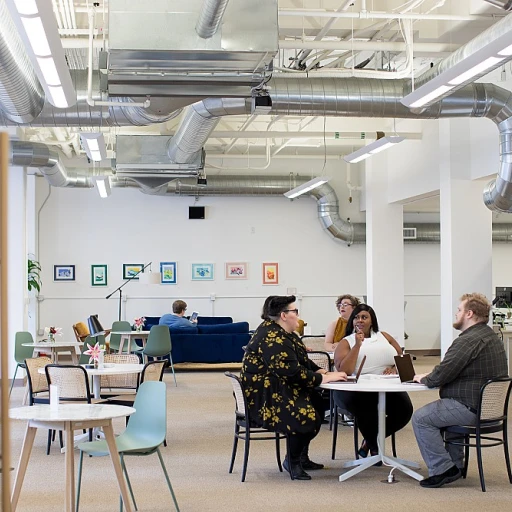
Understanding Pharmaceutical Staffing Agencies
Decoding the Landscape of Pharmaceutical Staffing
In the dynamic world of the pharmaceutical industry, recruitment isn't just about filling positions. It involves finding the top talent capable of driving innovation and growth. Pharmaceutical staffing agencies play a pivotal role in this arena by connecting esteemed life sciences companies with skilled professionals. From critical roles in clinical operations to demanding positions in regulatory affairs, these agencies are the gatekeepers of quality assurance in talent acquisition.
Pharmaceutical recruiters must navigate a complex landscape. With a thorough search process, they delve into specific domains such as pharmaceutical biotechnology and medical devices, reflecting the industry's varied hiring needs. Additionally, aspects like executive search for high-ranking positions and facilitating seamless candidate onboarding are part of their staple responsibilities.
Success in this field requires specialized knowledge and a keen understanding of the pharmaceutical market. By evaluating potential candidates for their specialized expertise, these staffing agencies ensure that the pharmaceutical companies they serve hire only the most qualified professionals. They aptly focus on sectors like scientific search for R&D roles, thereby ensuring robust development and continual growth in the sector.
Given the hiring landscape, the importance of crafting well-defined job descriptions becomes evident. This step not only clarifies expectations but attracts the right talent, making life easier for stakeholders involved in the recruitment journey.
The Benefits of Outsourcing Recruitment in Pharmaceuticals
Gaining Competitive Edge through Outsourcing
Outsourcing recruitment processes in the pharmaceutical sector offers a substantial competitive edge to companies operating within this complex landscape. By leveraging expertise from specialized staffing agencies, pharmaceutical companies can adeptly manage the growing complexities of talent acquisition in the life sciences field. The pharmaceutical industry demands incredibly specific knowledge and skills, particularly in areas like clinical operations, regulatory affairs, and quality assurance. Here, partnering with a pharmaceutical recruitment agency can ease the burden of identifying and engaging top talent. This collaboration allows pharmaceutical companies to focus on core competencies while ensuring that recruitment processes are handled by experts who are well-versed in the industry. Pharmaceutical recruiters possess a deep understanding of the life sciences and have established networks that they can tap into. This expertise not only accelerates the recruitment process but also significantly improves the quality of candidates by refining the search to meet highly specialized requirements. Agencies adept at scientific search, like Klein Hersh or those involved in executive search, can offer tailored solutions that align with specific company needs. Another advantage involves crisis and peak demand management. Outsourcing offers scalability, enabling pharmaceutical locksmiths to ramp up the hiring process during periods of increased demand or when urgent projects arise. Whether it’s an executive role or a more niche position like those in medical device development, these staffing companies provide the agility necessary to adapt swiftly and efficiently. Moreover, it’s worth noting how important it is to align with recruitment agencies well-acquainted with cutting-edge technologies in recruitment process outsourcing. The integration of advanced technologies in pharma hiring processes is revolutionizing the recruitment landscape, as discussed in our sections on technological innovations and future trends. Pharmaceutical recruitment agencies also offer a comprehensive approach to compliance and risk management, vital aspects considering the regulatory strictness in the industry. This service guarantees adherence to the stringent standards set forth by various international bodies, thus averting potential legal issues. Furthermore, for individuals seeking opportunities in this sector, engaging with a recruitment agency specializing in the pharmaceutical industry can open doors to potential career advancement, as detailed in our insights on opportunities in careers. For both companies and candidates alike, securing the right partnerships can drive success and foster growth within the pharmaceutical biotechnology field.Challenges Faced by Pharmaceutical Staffing Agencies
Overcoming Obstacles in the Recruitment Journey
Pharmaceutical staffing agencies, while indispensable in their role, face several challenges in their quest to source top talent for the life sciences industry. These challenges are multifaceted, stemming from both internal dynamics and external market conditions. Navigating the complexities of pharmaceutical recruitment requires adaptability, understanding, and a strategic approach.
One primary challenge is the highly specialized nature of roles in the pharmaceutical and life sciences sectors. Each position—whether in clinical operations, regulatory affairs, or medical device quality assurance—demands a precise set of skills and experience. This specificity often narrows the talent pool considerably, making the search for qualified candidates a daunting task.
The rapid pace of technological advancements in the industry adds another layer of complexity. As the pharmaceutical companies strive to remain at the cutting edge, the demand for candidates skilled in the latest scientific search and pharmaceutical biotechnology techniques grows. This can result in a skills gap, where the supply of adequately prepared candidates does not meet the industry demand, often delaying the hiring process.
Additionally, the competitive nature of the pharma industry means that top talent is often wooed by multiple recruiters. Pharmaceutical recruiters need to differentiate their executive search efforts, not only attracting but also retaining candidates who can help life sciences companies drive innovation and growth.
Recruitment process outsourcing (RPO) solutions are often sought after to alleviate some of these challenges, providing pharmaceutical companies with a strategic edge in locating and acquiring talent efficiently. The benefits, discussed in an earlier section, emphasize the crucial role RPO plays in enhancing recruitment outcomes. However, finding reliable partners, like RPO firms, that can offer personalized support and guidance is essential to overcoming these core challenges.
Technological Innovations in Recruitment Process Outsourcing
Innovative Tools Shaping Recruitment
Recruitment in the pharmaceutical industry is undergoing a transformative phase, heavily influenced by the penetration of cutting-edge technologies. In a market as competitive as pharma, companies are leaning on technological advancements to streamline their hiring processes and improve efficiency.
For pharmaceutical recruiters, the task of identifying top talent can be daunting, but recent innovation in recruitment tools offers some relief:
- Artificial Intelligence (AI) and Machine Learning: These tools are pivotal in automating the tedious parts of the recruitment process. By analyzing vast amounts of data quickly, AI can help executive search teams in identifying suitable candidates who match specific job requirements in clinical operations or regulatory affairs.
- Data Analytics: Companies can now harness data analytics to predict and understand hiring trends, enhancing their scientific search strategies. This shift not only expedites the executive search but also improves the quality of hires by providing insights into potential candidates' compatibility with a specific role.
- Virtual Reality (VR): VR is becoming an unconventional yet effective tool in candidate assessment and job training, especially in technical fields like medical device and life sciences. Through simulated environments, companies can evaluate the skills of potential hires more authentically.
- Mobile Recruitment Applications: With pharmaceutical recruiters on the go, mobile apps offer seamless job search experiences, expanding the candidate pool by making the application process more accessible.
These technological breakthroughs not only assist in recruiting top talent more effectively but also ensure that pharmaceutical staffing solutions remain agile and responsive to the fast-evolving industry demands. As these resources become more refined, their impact on the recruitment process will only grow, enhancing the scope of medical, clinical, and quality assurance hires. Companies leveraging these tools position themselves ahead in the competitive life sciences recruitment race.
Case Studies: Success Stories in Pharmaceutical Recruitment
Real-Life Success Stories in Pharmaceutical Recruitment
In the ever-evolving pharmaceutical industry, where top talent is often in high demand, recruitment agencies have played a pivotal role in bridging the gap between companies and candidates. Here are some notable examples of how pharmaceutical recruiting has led to successful outcomes, benefiting life sciences companies and professionals.The partnership between a leading pharmaceutical company and a specialized staffing agency resulted in the successful hiring of critical clinical operations personnel. Faced with a rapidly approaching project deadline, the company needed experts in regulatory affairs and quality assurance to ensure compliance and success in product development. By leveraging the executive search capabilities of the staffing agency, the company was able to swiftly onboard a team with the required skills and expertise, enabling them to meet their project goals on time.
Another example involves a top pharmaceutical biotechnology firm that collaborated with an industry-focused recruitment agency. The agency's search group tapped into a network of seasoned medical device professionals, addressing specific recruitment challenges. This alliance resulted in the timely recruitment of key talent for the firm’s new product line, ultimately enhancing the firm's competitive edge in the market.
Pharmaceutical recruiters played a crucial role in supporting a life sciences company facing a talent shortage in scientific search specializations. With a comprehensive understanding of the hiring landscape, the recruitment agency utilized a lock search strategy to identify candidates with niche expertise. This targeted approach not only filled gaps in the company's team but also improved their talent pipeline for future endeavors.
Finally, a major executive search effort by a staffing agency significantly benefited a global pharma company experiencing a high turnover rate. By revamping the recruitment process and enhancing the candidate experience, the agency helped the company stabilize its workforce. As a result, company morale and productivity saw a positive shift.
These case studies underscore the value of effective recruitment process outsourcing in fostering success within the pharmaceutical industry. By addressing distinct challenges and crafting tailored strategies, staffing agencies have proven to be essential partners in the pursuit of top talent.













